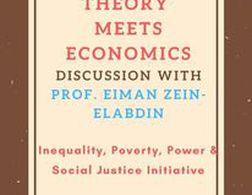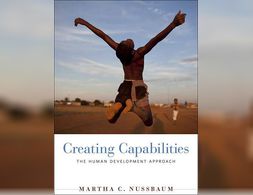156 results
The postcolonial critique of Economics is one of the sharpest and most comprehensive indictments of the discipline highlighting the discipline s limited treatment of power and culture and the incompatibility of the discipline s theoretical frameworks and predictions with the contexts of most formerly colonised territories This interview of Prof …
What determines the status of women in different communities? What role is played by women’s labor (inside and outside of the home)? By cultural norms regarding sexuality and reproduction? By racial/ethnic identity? By religious traditions? After some brief theoretical grounding, this course will address these questions by examining the economic, political, social, and cultural histories of women in the various racial/ethnic groups that make up the US today.
"Yuliya Yurchenko is a senior lecturer and researcher in political economy at University of Greenwich. She is currently in Ukraine on an extraordinary leave. And while she writes that she is, for the moment, in relative safety, that could change any moment. Being a Ukrainian, an activist and an academic, Yuliya traveled to Ukraine on Feb 19, 2022 as part of a fact-finding and solidarity mission with a number of MPs, trade unionists and journalists. The goal, she says, of this mission is to connect with civil society organizations, trade unions, activists and politicians, and “to express direct, cross-border solidarity from the UK working class to the Ukrainian working class.”
The goal of the course is to deepen students’ understanding of the Latin American development experience by viewing it through a gender lens.
Colonial Global Economy is a module of the Connected Sociologies Curriculum Project and examines the ongoing significance of colonial relations in the structure of the global economy It consists of 7 introductory lectures which range between 17 and 39 minutes of length In addition further readings resources and questions for …
Is capitalism the context where gender inequalities are reproduced, or is capitalism something more than a context? What are the differences among women and how can we place them theoretically and politically. Reproductive work, is it a women’s work? These questions are disscused in a three-session workshop.
One of the worlds leading economists of inequality, Branko Milanovic presents a bold new account of the dynamics that drive inequality on a global scale. Drawing on vast data sets and cutting-edge research, he explains the benign and malign forces that make inequality rise and fall within and among nations.
If a countrys Gross Domestic Product increases each year, but so does the percentage of its people deprived of basic education, health care, and other opportunities, is that country really making progress? If we rely on conventional economic indicators, can we ever grasp how the worlds billions of individuals are really managing?
Racism and discrimination have choked economic opportunity for African Americans at nearly every turn. In From Here to Equality, William Darity Jr. and A. Kirsten Mullen confront these injustices head-on and make the most comprehensive case to date for economic reparations for U.S. descendants of slavery.
Nature and communities in the global south is being overwhelmed at a shocking rate. In many places this is due to ventures such as large-scale open-pit mining, oil extraction in tropical areas, and the spread of monocultures. These and other such forms of natural resource appropriation are usually known as extractivisms.
La révolution numérique a profondément modifié notre société aussi bien sur notre rapport à l action publique qu aux entreprises en passant par notre vision de la démocratie Le numérique est devenu une composante essentielle de la vie individuelle et collective des citoyens dont on est loin d avoir à …
Toutes les sociétés humaines ont besoin de justifier leurs inégalités : il faut leur trouver des raisons, faute de quoi c'est l'ensemble de l'édifice politique et social qui menace de s'effondrer. Les idéologies du passé, si on les étudie de près, ne sont à cet égard pas toujours plus folles que celles du présent.
To grasp sex in all its complexity, including its relationship to gender, class, race and power, Srinivasan argues that we need to move beyond the simplistic views of consent in the form of yes-no, to rather consider the more complex question of wanted-unwanted.
The Price of Slavery analyzes Marx's critique of capitalist slavery and its implications for the Caribbean thought of Toussaint Louverture, Henry Christophe, C. L. R. James, Aimé Césaire, Jacques Stephen Alexis, and Suzanne Césaire. Nick Nesbitt assesses the limitations of the literature on capitalism and slavery since Eric Williams in light of Marx's key concept of the social forms of labor, wealth, and value.
Human Rights Economics strives for an economic system that is just for people and respectful of the planet that promotes social and economic justice that integrates a plurality of views and traditions and that is human rights consistent in both its processes and outcomes It posits that economics is blind …
Money is the fantasy that makes the world go round. Where did it come from and what is its future? From the Bank of England to Bitcoin and the Bristol Pound, LSE sociologist Nigel Dodd explores.
Adhering to the multiplicity of degrowth whilst also arguing that strategic prioritisation and coordination are key, Degrowth & Strategy advances the debate on strategy for social-ecological transformation. It explores what strategising means, identifies key directions for the degrowth movement, and scrutinises strategies in practice that aim to realise a degrowth society.
The Privatized State shows how privatization undermines the very reason political institutions exist in the first place, and advocates for a new way of administering public affairs that is more democratic and just.
It is perhaps fitting that the seriousness of the coronavirus threat hit most of the Western world around the Ides of March, the traditional day of reckoning of outstanding debts in Ancient Rome. After all, problems and imbalances have accumulated in the Western capitalist system over four decades, ostensibly since it took the neoliberal road out of the 1970s crisis and kept going along it, heedless of the crises and problems it led to.
The core of Georgism is a policy known as the Land Value Tax (LVT), a policy which Georgists claim will solve many of society and the economy’s ills. Georgism is an interesting school of thought because it has the twin properties that (1) despite a cult following, few people in either mainstream or (non-Georgist) heterodox economics pay it much heed; (2) despite not paying it much heed, both mainstream and heterodox economists largely tend to agree with Georgists. I will focus on the potential benefits Georgists argue an LVT will bring and see if they are borne out empirically. But I will begin by giving a nod to the compelling theoretical and ethical dimensions of George’s analysis, which are impossible to ignore.
How countries achieve long-term GDP growth is up there with the most important topics in economics. As Nobel Laureate Robert Lucas put it “the consequences for human welfare involved in questions like these are simply staggering: once one starts to think about them, it is hard to think about anything else.” Ricardo Hausmann et al take a refreshing approach to this question in their Atlas of Economic Complexity. They argue a country’s growth depends on the complexity of its economy: it must have a diverse economy which produces a wide variety of products, including ones that cannot be produced much elsewhere. The Atlas goes into detail on exactly what complexity means, how it fits the data, and what this implies for development. Below I will offer a summary of their arguments, including some cool data visualisations.
The global financial crisis (GFC) led to increasing distrust in economic research and the economics profession, in the process of which the current state of economics and economic education in particular were heavily criticized. Against this background we conducted a study with undergraduate students of economics in order to capture their view of economic education.
Stratification economics is defined as a systemic and empirically grounded approach to addressing intergroup inequality. Stratification economics integrates economics, sociology and social psychology to distinctively analyze inequality across groups that are socially differentiated, be it by race, ethnicity, gender, caste, sexuality, religion or any other social differentiation.
What’s inflation? Why is it relevant? And is there an agreed theory about its roots and causes, or is it a contentious concept? That’s what this text is all about: We define what inflation actually means before we delve into the theoretical debate with an interdisciplinary and pluralist approach: What gives rise to it, what factors might influence it, and, consequently, what might be done about it?
The Covid-19 pandemic has laid bare the deep structural rifts in modern capitalist economies. It has exposed and exacerbated the long-lasting systemic inequalities in income, wealth, healthcare, housing, and other aspects of economic success across a variety of dimensions including class, gender, race, regions, and nations. This workshop explores the causes of economic inequality in contemporary capitalist economies and its consequences for the economy and society in the post-pandemic reality, as well as what steps can be taken to alleviate economic inequality in the future. Drawing from a variety of theoretical and interdisciplinary insights, the workshop encourages you to reflect on your personal experiences of inequality and aims to challenge the way in which the issue is typically approached in economics.
Austrian economics focuses on the economic coordination of individuals in a market economy. Austrian economics emphasises individualism, subjectivism, laissez-faire politics, uncertainty and the role of the entrepreneur, amongst others.
Feminist economics focuses on the interdependencies of gender relations and the economy. Care work and the partly non-market mediated reproduction sphere are particularly emphasised by feminist economics.
Complexity economics focuses on interactions and interdependencies between individuals and structures in economic systems. Those are systems of organised complexity. High importance is given to the analysis of networks.
Evolutionary economics focuses on economic change. Hence processes of change such as growth, innovation, structural and technological change, as well as economic development in general are analysed. Evolutionary economics often gives emphasis to populations and (sub-)systems.
L’économie de la complexité se focalise sur les interactions et les interdépendances entre les individus et les structures dans les systèmes économiques. L‘économie est vue comme un système complexe qui est toujours dans un état de flux, c‘est-à-dire évoluant et changeant en permanence.
Mainstream inflation theories in economics do little to explain the recent acceleration in price increases. The associated economic policy recommendations further increase the misery of low-income groups.
The term "de-risking" can be seen as one element of a strategy aimed at discursively reframing the trade policy confrontation with China. This confrontation has mainly been driven by the US in recent years and received initially cautious, but later growing support from the EU.
Nous utilisons des cookies sur notre site Web. Cliquez sur Accepter pour nous aider à améliorer constamment Exploring Economics !





























